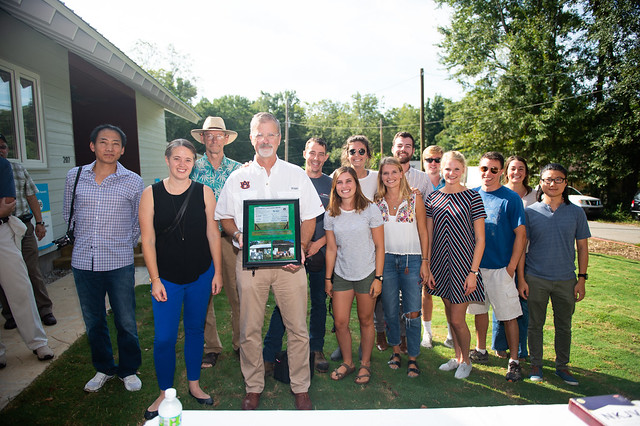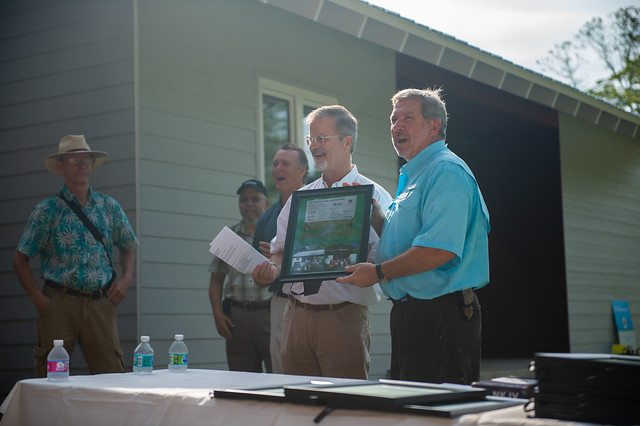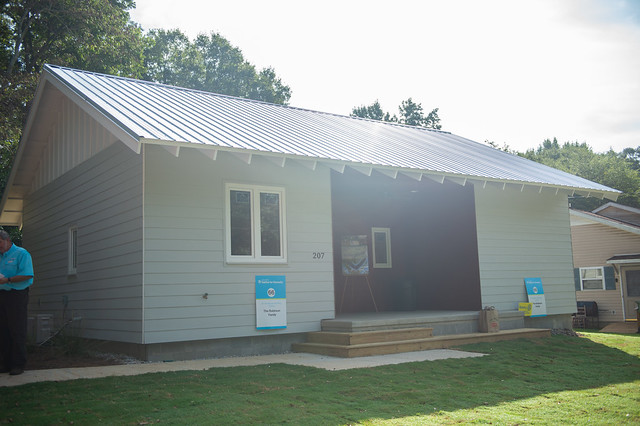Auburn University students design, build energy efficient Habitat for Humanity Home
Article body
A home designed and built by a team of Auburn University students was recently dedicated as the Auburn-Opelika Habitat for Humanity’s 66th home.
Built to Passive House standards, the home was built as part of the College of Architecture, Design and Construction Rural Studio’s 20K Initiative. The 20K Initiative was started to enable broader access to titled homeownership in underserved rural communities.
Working with other volunteers in the community, students from Auburn University’s School of Architecture, Planning and Landscape Architecture and the McWhorter School of Building Science dedicated nine months to the building of the Habitat for Humanity Home.
“The architecture program at Auburn is working to develop affordable housing options for families in our region that balance good design, affordable construction cost, lower operating costs and affordable homeowner’s insurance,” said Professor David Hinson, who helped to lead the project.
Dubbed the “Habitat / 20K Passive House,” Hinson explained that this is the first of several homes from the Rural Studio 20K portfolio to be built with extra attention to energy performance and resilience.
“We will monitor the actual operating costs once the homes are in use and compare the operating savings against the cost of incorporating these special features,” Hinson said. “Our aim is to find the balance point between the initial cost of constructing the home and lower operating costs that results in the best long-term solution for the families these homes are designed for.
This particular home was built for Michelle Robinson and her daughter, who worked alongside students and volunteers throughout the build.
“Auburn’s architecture program has a lot of different opportunities to get hands-on learning experience,” said Meghan Bernhardt, Auburn University architecture student. “Everybody benefits in the end, including the new homeowner and the students.”
Robinson’s home was designed after the first blueprint of this house, which was known as “Buster’s House.” Buster’s House was one of more than 20 versions of small, well-designed homes built in West Alabama by the Rural Studio program over the last decade. The 2018 team used the configuration of the Buster’s House as a guide for building the 20K Passive House but reconfigured it to focus on the improvements needed to elevate the energy performance to Passive house standards.
Aside from energy efficiency, the home is also built to be resilient to damage by severe storms, specifically high wind and hail.
“While we all understand the destructive power of tornadoes, its far more likely that the typical home in our region will be exposed to very high winds and hail many times over the life of the home,” Hinson said.
Computer-generated models are estimating that the 20K Passive House will have an annual savings of 60-75 percent in energy costs. For the homeowner, there’s one more benefit from the home: peace of mind.
“A storm damaged home can be one of the most disruptive events in anyone’s life, impacting our financial well-being as well as psychological and physical health,” Hinson said. “The increased resilience of the Habitat / 20K Passive House to damage from high wind and hail storms will provide Ms. Robinson, our homeowner, with the peace of mind that her home is less likely to be damaged by our most common form of severe weather.”
Related Media
Media interested in this story can contact Communications Director Preston Sparks at (334) 844-9999 or preston.sparks@auburn.edu.
Auburn University is a nationally ranked land grant institution recognized for its commitment to world-class scholarship, interdisciplinary research with an elite, top-tier Carnegie R1 classification, life-changing outreach with Carnegie’s Community Engagement designation and an undergraduate education experience second to none. Auburn is home to more than 30,000 students, and its faculty and research partners collaborate to develop and deliver meaningful scholarship, science and technology-based advancements that meet pressing regional, national and global needs. Auburn’s commitment to active student engagement, professional success and public/private partnership drives a growing reputation for outreach and extension that delivers broad economic, health and societal impact.







